The Good, the Bad and the (possibly) Interesting: Previews of some Spring global TV series
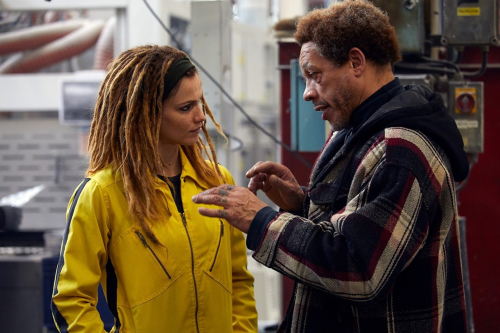
Dennis Broe previews some upcoming TV series. Image above: Machine, now streaming on Arte
What follows are a few global series worth watching in the coming months, along with a few not worth watching, and a few that have at least a curiosity quotient. These prereviews are of series at two French TV Fests: Series Mania, which bills itself as “where series begin” and is the largest festival of its kind; and from the International TV Festival titled Canneseries, on the site of the more famous Cannes Film Festival.
Each festival gives out final awards in different categories, and there were telling moments at each awards ceremony. At Series Mania, with the grand jury prize about to be bestowed, a young woman with a mild teargas canister took to the podium to garner support for the farmer’s protest, the “Cause Agricole,” that has shaken France, with farmers on their tractors barricading key cities including Paris because of the rising price of supplies. She was quickly led off the stage and not a word was said or written about her protest – in a way a fitting reminder that series TV usually fails to confront or else represses the crises going on around it.
At Cannes, the grand prize was awarded to The Zweiflers, a German series about the history of a Jewish family delicatessen which links the family’s contemporary survival to their enduring the Holocaust. One of the team members noted that the series was important because it was made for and appeared on German TV, allowing the creators to “confront their perpetrators.”
However, as the cast was leaving another member returned to the podium to make a positive reference to Israel. This seemed to be a deliberate attempt to counter the brave message from Jonathan Glazer, director of The Zone of Interest, at the recent Academy Awards, questioning the Zionist perversion of the principles of Judaism in Israel’s genocidal actions in Gaza. The twin pronouncements illustrate how the Jewish Holocaust is both a bitter reminder of European violence and of how it can justify ongoing contemporary holocausts.
The Good
Machine —This series, written by Thomas (A Prophet) Bidegain, available to be streamed for free on the Arte website https://www.arte.tv/fr/videos/RC-025010/machine/ crosses the always vibrant French social realist tradition with Kung Fu sequences. A young woman, escaped most likely from the French military, hiding out in a small town and counselled by a Marxist worker of colour, combats factory goons intent on breaking a strike in support of keeping the factory in France instead of the buyer’s intention of moving it to Poland to save money. The male-female camaraderie and the concealed power of the female combatant echoes the Gina Davis/Samuel L. Jackson film The Long Kiss Goodnight and makes for a compelling ride.
Dates IRL—This Norwegian series touchingly and with a good deal of humour confronts the problem of a generation raised in a virtual reality and not as the titled phrase suggests “In Real Life.” A 25-year-old, Ida, with an online relationship in the U.S. must enter the dating world when he “cheats” on her by having a physical relationship in his town. The dating world she enters though shows the strains of the online “reality” as she encounters one date whose sex life seems to have been torn from his own online porn activity and another who, possibly also for the same reason, climaxes “in eight seconds.” Very wise, satirical rendering of our current shattered reality, pointing up also that English is the digital language shared by the online couple, with its prominence indicating the global dominance of American tech.
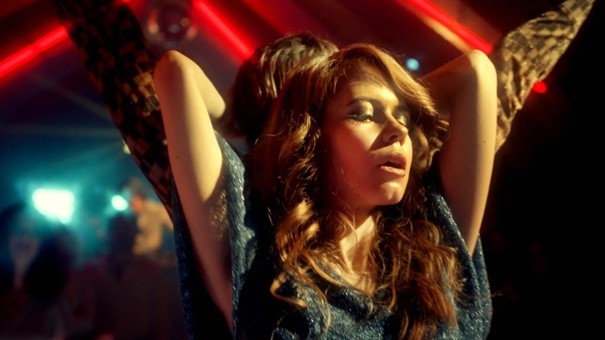
Disko 76: liberation on the dance floor
Disko 76—This is the most exuberant and liberatory of all the new series. Fleeing a bland marriage and an overbearing father whose oppressive rigidity recalls the Nazi era, the young German woman Doro and her more reluctant brother discover the glamour and freedom of the dance floor through the intervention of Black American G.I.s, and then open their own disco in the small town of Bochum. The music hums and the dancing, especially of a dance team, the male member of which Doro falls for, is a sensational revival of how, like rap later, the Disco era liberated not only the dance floor but the zeitgeist around it.
Operation Sabre—A tight, taut Serbian series which recounts how a Prime Minister falls victim to gangsters. The series set before the NATO bombing is very pro-NATO intervention, but it does offer a brisk recounting of an investigation into the affair with the music, which quotes Mission Impossible, constantly throbbing in the background and keeping this tale—which recounts how a TV journalist and an ingenue mob member helped bring the scandal to light— humming. The kind of ’70s Alan (The Parallax View) Pakula-type political thriller that has almost disappeared in the West.
Dark Horse—A Danish series about how the sins and insecurities of a mother, who constantly packs up and flees, are visited on her daughter as she lands in a tiny Danish town and tries to accommodate herself to the school “hot” boy by cooking her mother’s ketamine, leading to disastrous results. A cautionary tale where the blame falls not on the daughter, but on the parent’s own anxiety and neglect.
Blackout—A Korean series about a teen drunkard whose last high school binge may have resulted in the death of two girls. He cannot remember what happened because he drank so much, but his traces are all over a bloody scene that might have been the murder location. He is sent to prison, released ten years later, and now must confront his past and figure out who may have actually committed the crime in a town that hates him. A well-worn trope (Savage River, Back to Life, Rectify) but one that always, as here, produces an invigorating series that challenges the justice system.
The Bad

Maxima: 10 percent dates 1 percent
Maxima—Billed as “The Crown but in the Netherlands,” this series about an Australian investment banker working in New York who slowly falls for a Dutch prince is not a rags-to riches but rather a rich-to-richer tale. It asks the poignant question, “Can a girl from the 10 percent ever really be happy with a boy from the 1 percent?” Opening teaser, supposedly the most dramatic moment of the series, has the banker screaming at her royal mate, “You’re telling me my father can’t come to the wedding?” It’s all downhill from there.
Fiasco—This Netflix French production is about a fledgling director whose adventures on the set go horribly wrong. As so often happens with French humour, it punches neither up – that is, at the power structure (Netflix) financing the film – nor (thankfully) down at the crew, but rather sideways at the foibles of the “well-meaning” director. The fiasco is not only in the onscreen production but also in the meagre attempt here at satire-less humor. TV biz satire is done much better, pointedly and with actual humor by The Larry Sanders Show and the underrated Episodes.
The Source—This French police series, titled Ourika in French, views the 2005 uprising in the banlieue or Parisian ghetto from the point of view of a rookie cop and his gangster brother, neatly eliding the protest of a people who are the constant victims of French state neglect. Disgusting elitist claptrap.
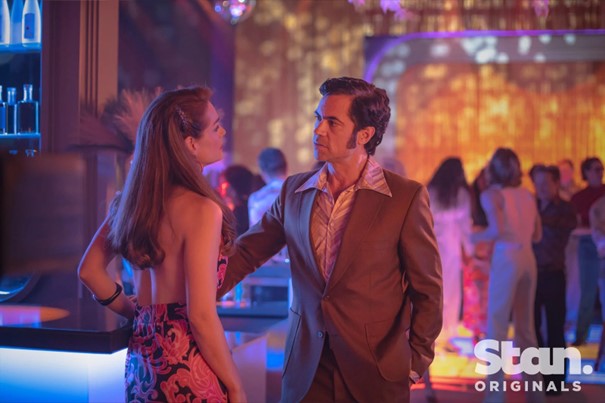
Hotel Cocaine: a series that disappears up your nose
Hotel Cocaine—This mirthless series by Narcos creator Chris Brancato, centred around a Miami hotel at the height of both the disco and cocaine frenzy, unlike Disco ’76, misses the exuberance of the moment in the decision to save money by not buying the rights to disco hits, and by its ill-conceived idea that watching gangsters put stuff up their nose is sexy and engaging. It traces the conflict of two Cuban brothers, the manager of the hotel and a drug lord, in a well-worn trope which is executed grimly and unimaginatively.
Soviet Jeans—Latvian series set in Riga in the 1970s whose hero, presented as a rebel, is a petty crook on the lookout for blue jeans and Walkmans, which to him signify freedom in a heavily regulated and surveilled society. The problem here is the commercial alternative to an oppressive state is the detritus of market capitalism.
After The Party—New Zealand show starring Brit Commonwealth stalwarts Peter Mullen and Robyn Malcolm in a series where Malcolm’s rude, offensive, and self-righteous schoolteacher is gaslighted by Mullen’s superficially endearing ex-husband. The problem with the series is that the Malcolm character is not just a difficult woman – we’ve seen that before and it often works – but rather a domineering and oppressive one who is right at every turn, even as she attempts to control her students. It’s like cheering on the bellicose Kissinger disciple Hilary Clinton over the corrupt racist Donald Trump, when in fact it’s very difficult to tell which one is more insidious. In this series, as in real life, the answer is both.
The (possibly) Interesting
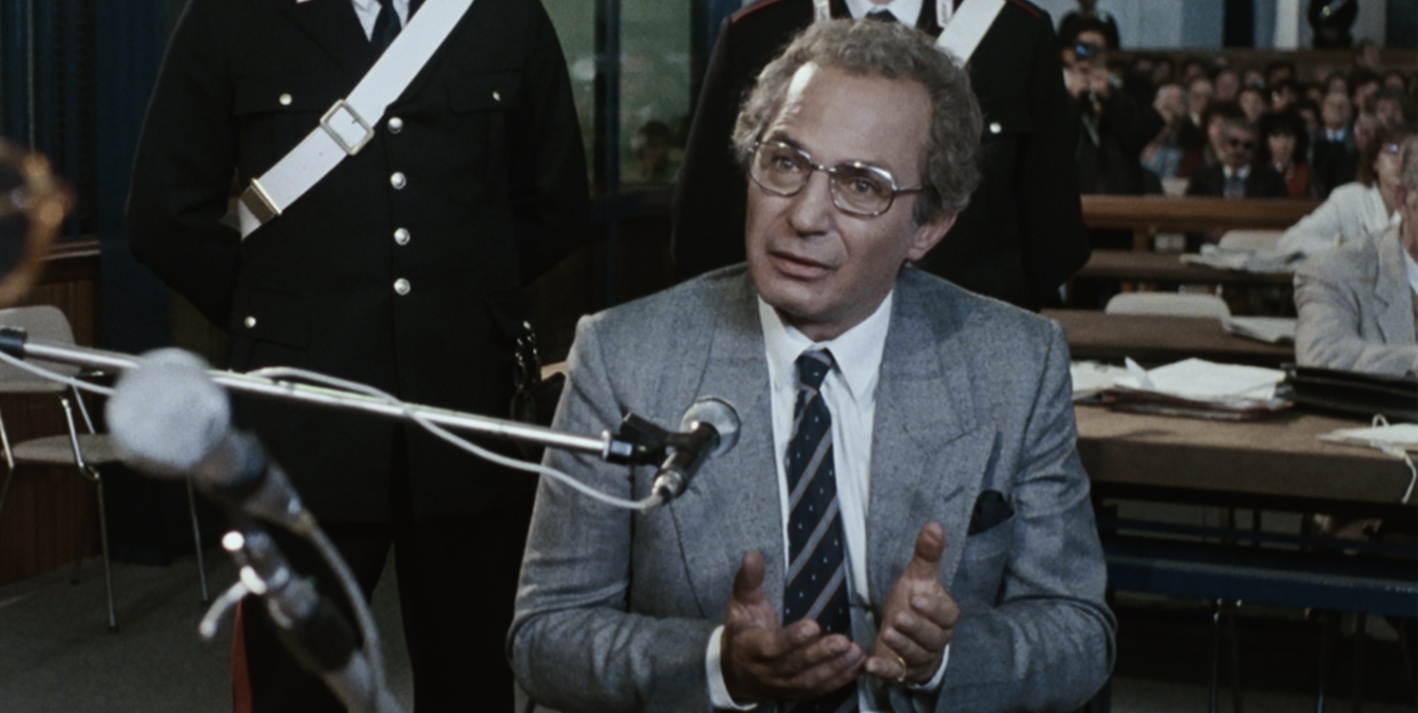
Ben Gazzara’s mob boss pontificating in Il Camorrista
Il Camorrista/The Vatican—The first, directed by Cinema Paradiso’s Giuseppe Tornatore, stars Ben Gazzara as a Southern Italian mobster. The 1986 series, which was also shot as Tornatore’s first film, was never released because the mobster it was clearly based on threatened the director and producers both legally and physically. With he and his wife now deceased, the series is finally getting a release. High point of a series that features a flawless Gazzara is his appearance in episode 4 before the magistrate where he is charged with over 300 killings. He waves his hands and professes (the original English title of the film was The Professor) to have no idea why he is there since he only ever wanted to help people.
The Belgium documentary The Vatican, a kind of lukewarm treatment of the corruption and sexual crimes of that institution, has a remarkably similar scene of a cardinal, himself perhaps implicated in embezzling funds, claiming that likewise he also “only wants to help people.”
Herrhausen – The Banker and The Bomb—An almost documentary portrayal of the Deutsche Bank high official who created a sensation in the financial world by in 1987, at the height of the global and particularly Latin American debt crisis, proclaiming that banks should be in the business of forgiving debt to allow Third World countries to grow. Herrhausen then “pioneers” female integration into the banking hierarchy and embraces computers as part of the beginning dominance of financialization. He is monitored by the CIA for his stand on debt but also eventually the victim of, as the series has it, a combination of the East German Stasi and the Red Army who are sheltered and aided in the Arab cities of Baghdad and Damascus. Yeah to the expose of the “dangers” of Herrhausen’s wanting to cancel debt. Nay to the way the series represents his latter “improvements” as neutral and the paranoid way it brings together disparate elements which oppose him.
Apples Never Fall—New centre of conservative luxury, West Palm Beach, is the site of this family expose and mystery series starring an imposing Annette Benning as a supposedly happy wife gone missing. Apples is yet another adaptation of a Liane Moriarty novel, incisive in Pretty Little Lies, insipid in Perfect Strangers. The mystery element works well here but the supposed “exposing” of family secrets mostly amounts to sibling bickering about which parent loved who the best.
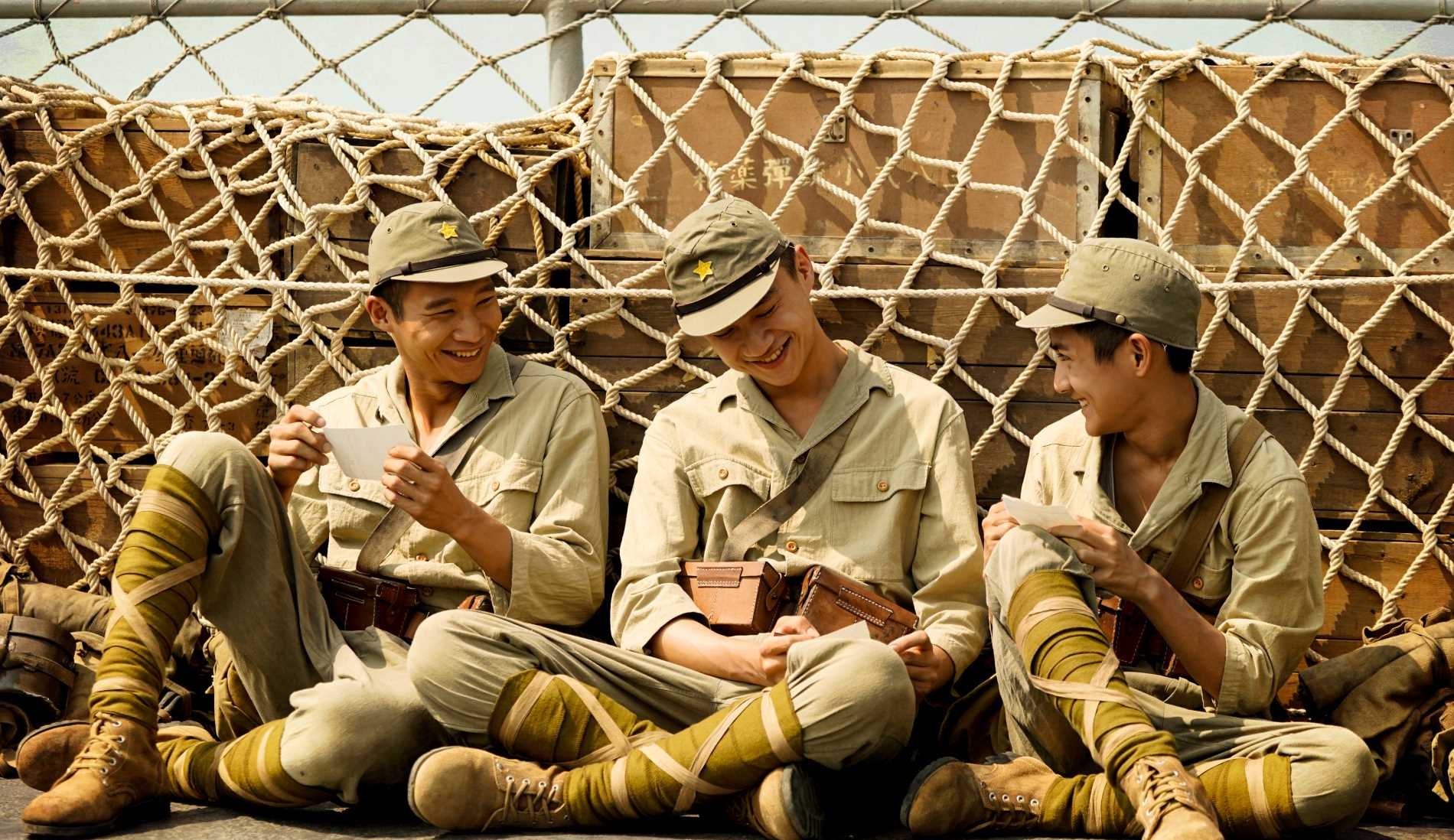
Three Tears in Borneo: where have all the Malaysians gone?
Three Tears In Borneo—A Taiwanese series set in Malaysia about three brothers who get commandeered into the Japanese army and must participate in atrocities performed on the Australian prisoners in World War II. An unusual setup but a strange perspective, that in points exonerates the jailers while never mentioning the Malays surrounding the prison, thus mimicking the Japanese imperialism of the time.
House of Gods—The positive part of this series is that it offers a perspective on the customs of an Iraqi mosque in Australia. It has been described as “Succession in a mosque,” and that’s the negative part, the overlay of Western politics on a series that could have shown more of the inner workings and manners without the ultra-competitive,“electoral” overlay.

Dennis Broe
Dennis Broe is the author of The House That Buff Built, the upcoming fourth volume in the Harry Palmer mystery trilogy whose subject is homelessness and the real estate industry, racial prejudice against the Chinese in Los Angeles, and the power of major media to set the development agenda.
